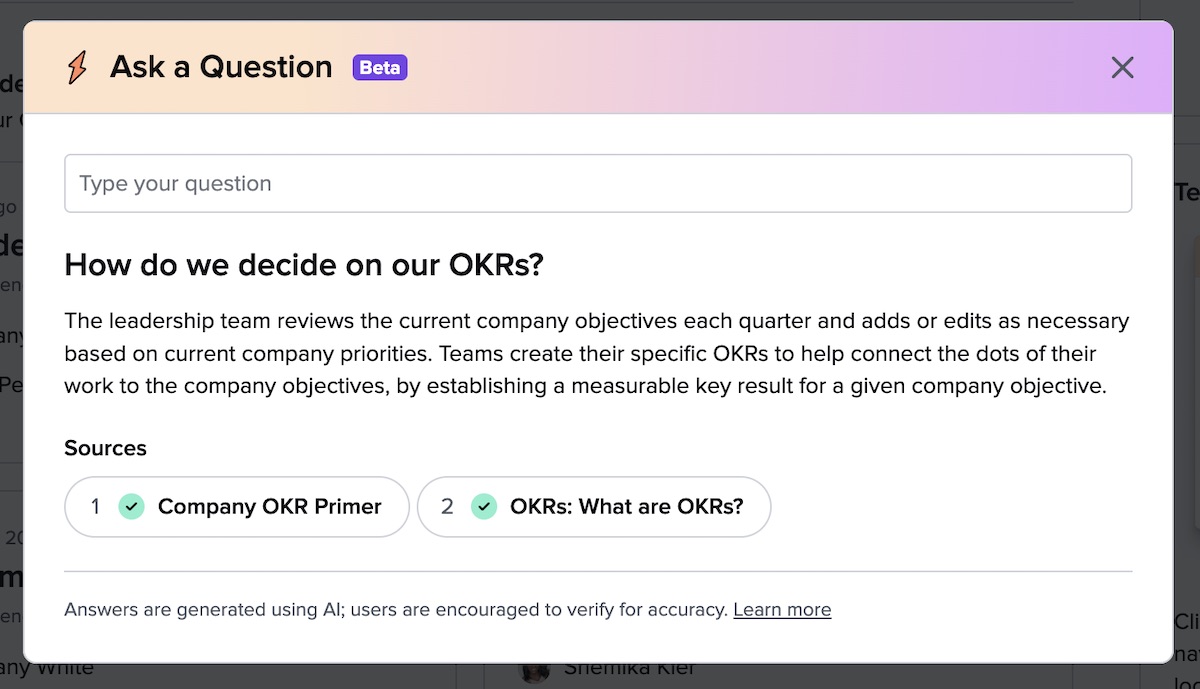Most of us have been here: You’re looking for one specific piece of information that you suspect belongs on either your company’s Slack account, internal human resources documentation or maybe deep in a Google sheet, and you don’t know where to start.
You could spend an hour poking around all these sources of information — or you could use some AI assistance. It’s the thinking behind Center City-based Guru Technologies‘ new tool, Answers.
CEO Rick Nucci explained the development of the new tool and his stance on the quickly evolving AI offerings. With Answers, a user will be able to ask a question and get a result that’s sourced from a document, messaging tool, knowledge base, or any app that has been connected to Guru’s knowledge management platform. Then, that user can document that information in Guru with the help of Assist — another tool using generative AI — to summarize that information.
“How do we unlock the collective intelligence of a company, right?” Nucci said of Answers. “How do we tap the knowledge and know-how of every employee and make it accessible to a whole company to help them do their jobs better?”
The aim is to cut down on silos of information in workplaces. Workers can spend a lot of time searching for and documenting information, and should be spending more time using that knowledge for business outcomes, Nucci said.
Guru has been exploring AI since at least 2019, and Answers is the most recent in a trio of AI tools the company developed to refocus time and energy around seeking knowledge. Guru also released Assist, a generative AI tool that can create, refine and summarize content, and Trending Topics for Slack, which proactively scans a Slack channel for frequently asked questions and converts it into evergreen content.
Guru is currently working with OpenAI, the company behind ChatGPT, on Answers. The tool is currently in a beta phase, and works with whatever knowledge bases — Google Drive, Slack, HR information — are integrated with Guru. Here’s some questions you might ask Answers:
- “When is our open enrollment period?”
- “How can I best prepare for our annual performance reviews?”
- “Do we have pet insurance?”
- “How do I fill out this request for proposal form?”
Answers follows the reasoning Nucci sees for artificial intelligence tools right now — it allows technologists to think about problems they have in a new way. He understands the hesitations folks have about the larger implications of AI, and says he too sees a “valid future fear” where we’re going to have to get our arms around regulation.
But he doesn’t see it eliminating jobs. He sees it making folks more productive.
“I think, really importantly, our team had to dig in and go like, ‘What problems can this technology actually solve for our customers?’ truly, versus trying to use something in a way that it really isn’t meant to do, or in a way that’s a little too bleeding edge,” Nucci said. “How we can let customers interact with Guru by asking questions without having to know the right words to use, not having to know this phrase or that phrase, and sort of speak more with natural language?”
Before you go...
Please consider supporting Technical.ly to keep our independent journalism strong. Unlike most business-focused media outlets, we don’t have a paywall. Instead, we count on your personal and organizational support.
Join our growing Slack community
Join 5,000 tech professionals and entrepreneurs in our community Slack today!

The person charged in the UnitedHealthcare CEO shooting had a ton of tech connections

From rejection to innovation: How I built a tool to beat AI hiring algorithms at their own game

Where are the country’s most vibrant tech and startup communities?



